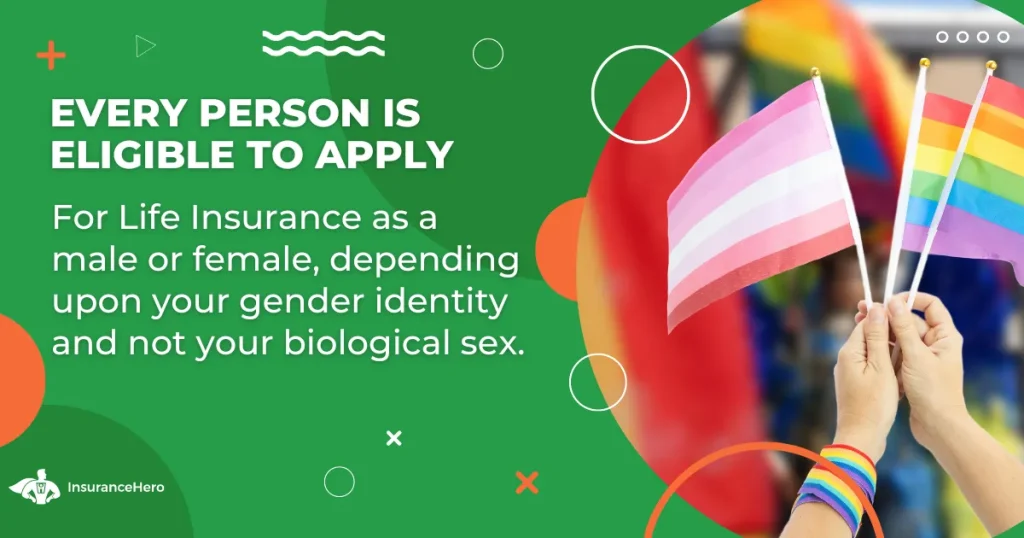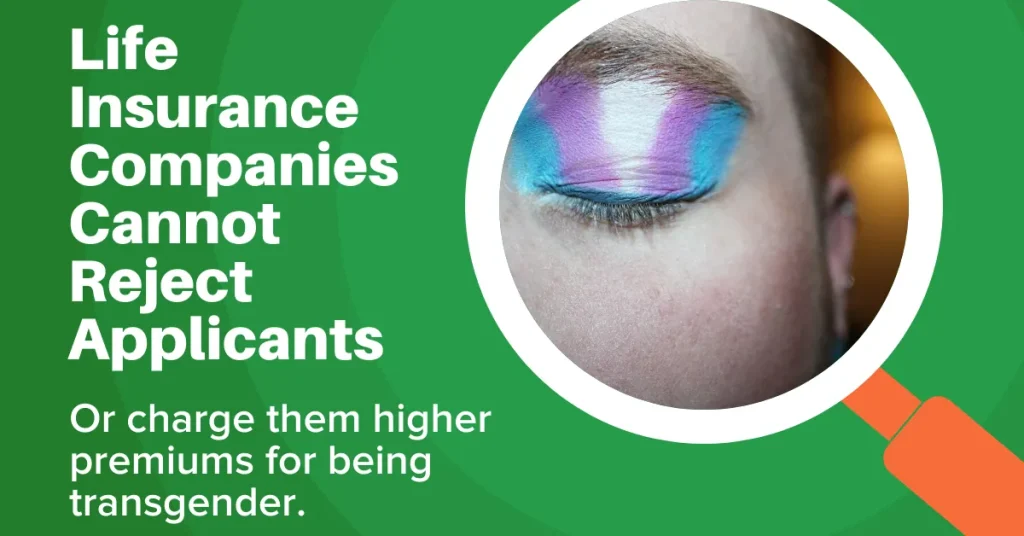Transgender Life Insurance: A Comprehensive Guide

Insurance Hero is dedicated to helping those deemed “non-standard” by insurance firms secure coverage, including Transgender life insurance, critical illness coverage, and income protection.
One might think that gender reassignment treatment wouldn’t be considered “non-standard” when applying for life insurance, critical illness coverage, or income protection. This is true, provided there are no complications from the surgery and a good amount of time has passed since the treatment.
At Insurance Hero, we understand the complexities of non-standard applications and are here to help people get what they need from the insurance process.
Our team of experts is here to guide you through the process and help you secure the coverage you deserve.
We recognise the importance of gender diversity and ensure everyone is treated equally. We should create an environment where individuals can express themselves without fear of discrimination.
What If The Unthinkable Happened To You? Help Ensure Life Goes On
⏱ Transgender Life Insurance Enquiry Form. Get Your No-Obligation Quote Today


Introduction
💡 Did you know that life insurance is an essential financial planning tool for everyone, including transgender individuals?
With the right policy, you can secure your loved one’s financial future and protect them from unexpected burdens. However, transgender individuals often face unique challenges and complexities when seeking life insurance. That’s where this guide comes in.
We aim to provide an extensive and engaging resource that addresses the specific needs and concerns of transgender people in the UK regarding life insurance.
Our unique value proposition is that we focus exclusively on the transgender community, providing relevant and up-to-date information, resources, and support.
By the end of this article, you’ll have a solid understanding of transgender life insurance and the confidence to navigate the application process successfully.
Understanding Transgender Terminology
To ensure a smooth experience when searching for life insurance, one must be familiar with key terminology in the transgender community and the insurance industry.
Transgender definitions and concepts
Transgender refers to individuals whose gender identity differs from the sex they were assigned at birth. The term can encompass various identities, such as trans men, trans women, and non-binary individuals. Familiarity with these terms will help you understand the nuances of transgender life insurance.
Gender identity vs sex assigned at birth
Gender identity refers to a person’s internal sense of being male, female, or another gender. In contrast, sex assigned at birth is a label given to individuals based on physical and genetic characteristics. We have written a detailed resource which explains how genetics and genetic tests might affect life insurance premiums.
Understanding these differences is crucial when discussing life insurance policies and premiums.
Key terms used in the life insurance industry
When dealing with life insurance, you will encounter several terms, such as premiums, beneficiaries, underwriting, and payouts.
Familiarising yourself with these terms will help you better understand policy details and make informed decisions.
Legal Framework and Discrimination Laws
Several laws protect transgender individuals in the UK from discrimination, ensuring fair treatment in various aspects of life, including life insurance.
The Equality Act 2010
The Equality Act 2010 prohibits discrimination based on several protected characteristics, including gender reassignment. Insurers must treat transgender applicants fairly and not discriminate based on gender identity.
Gender Recognition Act 2004
The Gender Recognition Act 2004 allows transgender individuals to obtain a Gender Recognition Certificate (GRC), legally recognizing their acquired gender. While possessing a GRC may not directly impact your life insurance, knowing your rights and legal protections is essential.
Data Protection Act 2018
The Data Protection Act 2018 protects individuals’ personal data, including sensitive information about gender identity and medical history. Insurers must handle your information securely and confidentially.
Transgender Rights in Life Insurance
Transgender individuals have specific rights in the life insurance application process to ensure fairness, confidentiality, and access.
Fair treatment and non-discrimination
Insurance providers must treat all applicants fairly, including transgender individuals. This means that they cannot deny coverage or charge excessive premiums based solely on your gender identity.
Confidentiality of personal information
Insurers must handle your personal information, such as your gender identity and medical history, with the utmost confidentiality. They must follow the Data Protection Act 2018 to protect your privacy.
Access to life insurance products
Transgender individuals can access the same life insurance products as cisgender individuals. Insurers cannot exclude you from specific policies or products based on your transgender status.

Gender Identity and Insurance Rates
Various factors, including gender, can influence life insurance premiums. Understanding how gender identity affects insurance rates is crucial for transgender applicants.
Factors influencing premium calculations
Insurers use various factors to calculate premiums, such as age, health, lifestyle, and gender. While factors like age and health are considered more significant, gender may also play a role in premium calculations.
Gender-based pricing
Historically, insurers have used gender-based pricing, which may result in different premium rates for men and women. However, the European Court of Justice’s 2012 ruling declared gender-based pricing unlawful, and insurers must now use unisex pricing models.
Transgender individuals and premium rates
Although gender-based pricing is no longer allowed, insurers may still consider your sex assigned at birth when calculating your premium. However, they cannot charge higher premiums solely based on your transgender status.
Factors Affecting Life Insurance Premiums for Transgender Individuals:
| Factor | Description | Impact on Premiums |
|---|---|---|
| Gender Identity | The gender with which the individual identifies. | Insurers typically base premiums on the individual’s affirmed gender. |
| Transition Status | Whether the individual has undergone or plans to undergo gender-affirming treatments or surgeries. | Medical history and potential future treatments can impact premiums. |
| Age | The age of the individual at the time of policy issuance. | Older individuals typically pay higher premiums. |
| Health | The overall health and medical history of the individual. | Poor health or pre-existing conditions can lead to higher premiums. |
| Occupation | The nature of the individual’s occupation. | High-risk occupations can result in higher premiums. |
| Lifestyle | The individual’s lifestyle choices include tobacco use, alcohol consumption, and exercise habits. | Unhealthy lifestyle choices can lead to higher premiums. |
| Coverage Amount | The size of the death benefit being purchased. | Higher coverage amounts result in higher premiums. |
Disclosing Transgender Status to Insurers
Transparency during the life insurance application process is crucial, but disclosing your transgender status can be sensitive.
The importance of full disclosure
Full disclosure is essential when applying for life insurance. Providing accurate and complete information about your gender identity and medical history ensures that the insurer can assess your risk accurately and offer you the best possible policy.
Risks of non-disclosure
Failing to disclose your transgender status or medical history can have serious consequences. If an insurer discovers that you withheld information, they may deny a claim, cancel your policy, or even accuse you of fraud.
Medical Underwriting for Transgender Applicants
Life insurance underwriting involves assessing an applicant’s risk based on their health and medical history. Transgender individuals may face unique considerations during this process.
Health conditions and risks
Transgender individuals may have specific health conditions or risks related to their gender identities, such as hormone therapy or gender-affirming surgeries. Insurers will consider these factors during the underwriting process.
Hormone therapy and surgeries
Hormone therapy and surgeries can affect an individual’s health and life expectancy. Insurers may request details about your treatment, such as the type and duration of hormone therapy and the dates and outcomes of any surgeries.
Mental health considerations
Mental health is an essential aspect of the underwriting process. Transgender individuals may experience higher rates of depression, anxiety, or other mental health issues. Be prepared to disclose any mental health conditions and treatment during the application process.
Navigating the Application Process
The life insurance application process can be complex, but being prepared and knowing what to expect can help make it smoother.
Preparing for the application
Before applying for life insurance, gather relevant documentation, such as your medical records, hormone therapy prescriptions, and details of any surgeries. Having this information readily available will help expedite the application process.
Communicating with insurers
When communicating with insurers, be honest and transparent about your transgender status and medical history. Establishing a clear and open line of communication can help you build trust and avoid misunderstandings.
Common challenges and pitfalls
Transgender applicants may face unique challenges during the application process, such as confusion over gender identity or medical history. Preparing to address these issues and advocating for yourself can help ensure a smoother experience.
Engaging with a knowledgeable broker
Working with an experienced and knowledgeable insurance broker can be invaluable. They can help you navigate the application process, find the best policy, and advocate for your rights as a transgender applicant.
Comparing Life Insurance Options
There are various life insurance policies and providers available. Comparing your options can help you find the best policy for your needs.
Types of life insurance policies
Common life insurance policies include term life, whole life, and over 50s life insurance. Each type offers different levels of coverage, investment components, and premium structures. Researching these policies will help you make an informed decision.
Features to consider
When comparing life insurance policies, consider coverage amount, premium rates, policy term, and additional features like riders or conversion options. These elements can significantly impact your policy’s suitability for your needs.
Shopping around for the best policy
Take the time to shop around and compare quotes from multiple insurers. This can help you find the most affordable and appropriate policy.
Advocacy and Support
Transgender individuals may benefit from seeking support and resources during the life insurance application process.
Transgender support groups
Transgender support groups can provide valuable advice, resources, and emotional support during the application process. Contact local or online groups to connect with others who have experienced similar challenges.
Legal assistance and advice
Sometimes, you may need legal assistance or advice to navigate complex insurance issues or advocate for your rights. Consulting a legal professional or seeking guidance from organisations specialising in transgender rights can be helpful.
Financial planning resources
Transgender-specific financial planning resources can provide insights and guidance on life insurance and other financial planning topics. Research online resources or consult a financial planner specialising in transgender issues.
Transgender Support Groups in the UK:
| Support Group | Location | Description |
|---|---|---|
| Gendered Intelligence | Nationwide | Offers support, resources, and workshops for transgender people and their families. |
| Mermaids | Nationwide | Provides support to transgender and gender-diverse children, young people, and their families. |
| The Gender Trust | Nationwide | Offers information and support for transgender people and their families. |
| TransUnite | Nationwide | An online directory of transgender support groups across the UK. |
| Sparkle | Manchester | Organizes the annual Sparkle Weekend, a national transgender celebration, and offers support throughout the year. |
| The Clare Project | Brighton | Provides support and information for transgender people and their families in Brighton and the surrounding areas. |
| London Friend | London | Offers support and counselling services for LGBT+ people, including specialized support for transgender individuals. |
Handling Rejections and Appeals
If your life insurance application is rejected, it’s essential to understand the reasons and explore your options.
Understanding the reasons for rejection
Insurers may reject applications for various reasons, such as high-risk medical conditions or incomplete information. Knowing the reasons for rejection can help you address the issue and improve your chances of approval.
Appealing a decision
You can appeal the decision if you believe your application was unfairly rejected. Contact the insurer to discuss your concerns and provide any additional information that may help your case.
Exploring alternative insurance options
If your application is rejected, consider exploring alternative insurance options, such as group policies through your employer, professional associations, or specialised insurers that cater to transgender individuals. These options may offer more flexibility and acceptance of unique circumstances.
Transgender Life Insurance Conclusion
Navigating the world of transgender life insurance in the UK can be complex. Still, with the right knowledge, support, and perseverance, you can secure the financial protection you and your loved ones deserve.
Understanding your rights, the application process, and the unique considerations for transgender individuals is crucial for a successful experience. Use the information and resources in this comprehensive guide to help you find the best life insurance policy for your needs.
Transgender Life Insurance FAQs
Is there a gender difference in life insurance?
Gender-nonconforming applicants won’t be charged a higher rate because of their gender identity, but they will still need to apply for a policy under either male or female.
According to a 2021 Life Insurance and Market Research Association study, women are far less likely to have life insurance than men.
The study found that only 47% of women have life insurance, compared to 58% of men.
This gender gap in life insurance ownership is concerning, as it can put women and their families at risk if something happens.
Life insurance is an important financial tool for protecting loved ones from the financial burden of unexpected events.
Women should take steps to close the gender gap in life insurance ownership by researching their options and finding the best policy for their needs and budget.
It’s also important to note that there may be differences in cost between genders regarding certain types of insurance policies.
While some insurers may consider gender when setting rates, this isn’t always the case, depending on where you live and what type of policy you’re looking for.
Overall, it’s clear that there is a gender difference in life insurance ownership that needs to be addressed. Women should take steps to close the gap by researching their options and finding the right policy for them and their families.
Which is the best life insurance policy for transgender people in the UK?
The best life insurance policy for transgender people living in the UK depends on various factors, including the individual’s age, health, lifestyle, and financial situation.
Comparing different policies and finding one that meets your specific needs is important.
When looking for a life insurance policy as a transgender person, you should consider any exclusions or restrictions that may be in place due to your gender identity.
Additionally, it is important to ensure the policy covers any medical treatments related to gender transition.
It is also important to look into any additional benefits of certain policies. For example, some insurers offer discounts for couples or families who purchase life insurance together.
Some policies may provide additional coverage if you are diagnosed with a serious illness or disability.
Make sure to read the fine print and ask questions if there is something you don’t understand.
Steve Case is a seasoned professional in the UK financial services and insurance industry, with over twenty years of experience. At Insurance Hero, Steve is known for his ability to simplify complex insurance topics, making them accessible to a broad audience. His focus on clear, practical advice and customer service excellence has established him as a respected leader in the field.


